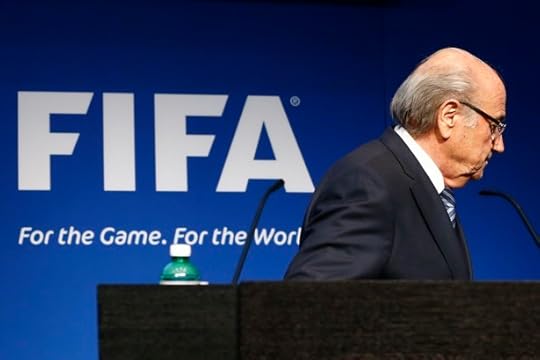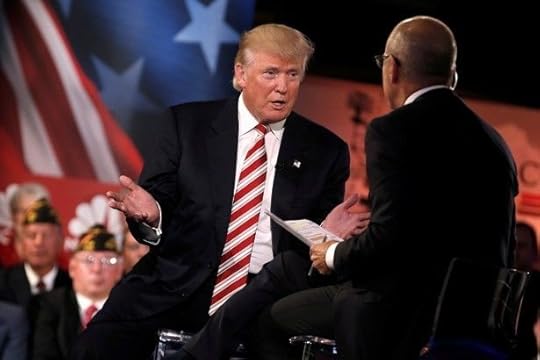Atlantic Monthly Contributors's Blog, page 82
September 9, 2016
FIFA's Internal Ethics Inquiry

NEWS BRIEF Sepp Blatter, the disgraced former FIFA chief, and two of his top deputies, are being investigated by soccer’s governing body, months after they were suspended after it was revealed the men had gifted themselves millions of dollars in secret bonuses and salary increases.
Djimbaraye Bourngar, the deputy chairman of the ethics committee’s investigatory chamber, opened an investigation Friday into Blatter, FIFA’s former president, Jérôme Valcke, the organization’s former secretary general, and Markus Kattner, former chief financial officer and deputy secretary general. All three men will be investigated for five alleged violations of FIFA’s Code of Ethics (FCE), including general rules of conduct, loyalty, conflicts of interest, offering and accepting gifts and other benefits, and bribery and corruption.
Kattner will also face an investigation into a possible violation of article 16 of FCE, which deals with confidentiality.
As my colleague J. Weston Phippen previously reported, a Swiss police raid of FIFA’s Zurich offices in June uncovered evidence revealing the three men had secretly approved bonuses for each other between 2011 and 2015 totaling nearly $80 million. The discovery resulted in the firing of Kattner, and the suspension of Blatter and Valcke for six and 10 years, respectively. Both suspensions came with a ban from all football-related activities for the duration of the suspension.
The ethics committee also handed a life ban from all football-related activities and a $1 million fine to Jeffrey Webb, FIFA’s former vice president. The ban, which takes effect immediately, follows Webb’s guilty plea in November in which he admitted to racketeering conspiracy, wire fraud, and money laundering.

The Pitfalls of 9/11-Themed Advertisements

NEWS BRIEF New rule: don’t make advertisements that are 9/11-themed.
Sunday marks 15 years since the September 11 terrorist attacks. It’s a day of reverence and mourning for most. But for others, it’s a sales opportunity.
A Panama City, Florida, Walmart on Wednesday took down a display of Coke Zero 12-pack boxes that re-created the two World Trade Center towers that collapsed in the 2001 attack. Behind the towers was an American flag made of Coke, Diet Coke, and Sprite boxes. A sign above the display said, “We Will Never Forget.” And neither will customers when they take advantage of the Rollback prices at just $3.33 each.
Florida c'mon man pic.twitter.com/HU4y2rxgFG
— Shawn (@online_shawn) September 6, 2016
The display left some in outrage, forcing Walmart to take it down. The company said in a statement:
We hold this moment in our country’s history in the highest regard, and there was nothing disrespectful intended by the display.
But it wasn’t just Walmart getting in on ads themed around the terrorist attacks that killed 2,976 people. A mattress store in San Antonio, Texas, released a television ad promoting a twin mattress sale on September 11. The ad, which has since been deleted off Miracle Mattress’ Facebook page, ends with “staff fall screaming into two large towers of mattress, knocking them over,” reports the BBC, as a voiceover says, “We’ll never forget.”
Mike Bonano, the owner of the store, apologized in a letter, saying the ad was produced without management’s permission and that he was “disgusted” it was used a promotional tool. He adds:
I say this unequivocally, with sincere regret: the video is tasteless and an affront to the men and women who lost their lives on 9/11. Furthermore, it disrespects the families who lost their loves ones and continue to struggle with the pain of this tragedy every day of their lives.
So, here’s the lesson: It’s hard to make a 9/11-themed advertisement work, regardless of anyone’s intentions.

The Foiled Paris Attack

Updated September 9 at 1:19 p.m.
NEWS BRIEF French authorities announced Friday the arrest of a 19-year-old woman believed to be planning an attack after pledging allegiance to the Islamic State, Agence France-Presse reports.
The woman, identified as Ines Madani, was arrested alongside a 23-year-old woman and a 39-year-old woman Thursday in Boussy-Saint-Antoine, a suburb south of Paris, in connection with a discovery by French police Sunday of a vehicle found containing seven gas cylinders near Paris’s Notre Dame Cathedral. Though no detonator was found, police feared the car, a Peugeot 607 left with its hazard lights flashing without license plates, would be used for an attack.
Investigators say Madani, believed to be the daughter of the vehicle’s owner, was the primary suspect behind the foiled attack. Reuters reports the Peugeot’s owner alerted police Sunday of both his daughter and the car’s disappearance, further adding the daughter had been known to police for expressing aspirations to travel to Syria. One source close to the investigation said authorities found a letter in the woman’s possession in which she pledged her allegiance to the Islamic State.
Prosecutors said Friday that one of the women, known only as Sarah H., was found to have been engaged to be married to two men linked to attacks carried out earlier this year. Larossi Abballa, 25, was killed in a police raid in Magnanville after he pledged his allegiance to ISIS and killed a policeman and his partner in June. The other, 19-year-old Abdel-Malik Nabil Petitjean, was identified as one of two attackers responsible for the killing of a French priest during a church service in Normandy in July.
Bernard Cazaneuve, the French interior minister, announced Thursday after the arrest that Madani had been shot and wounded, and that one officer was hospitalized for a knife wound inflicted by one of the women.
“These young women, aged 39, 23, and 19, had been radicalized, were fanatics, and were presumably preparing an imminent, violent attack,” Cazaneuve said.
French President François Hollande commended the police, and called for even greater vigilance.
“One group was destroyed, but there are others,” Hollande said Friday from a news conference in Athens, the Greek capital.
France has been under a national state of emergency following several high-profile attacks in the country in less than two years, including an attack in Nice in July in which 84 people were killed. Since the beginning of 2016, French authorities say more than 260 people have been arrested for links to terrorist networks.

Spain's Deadly Train Crash

NEWS BRIEF A train crash in Spain has killed at least four people and injured nearly 50 others after it derailed in the northwest region of the country.
About 65 people rode the Portugal-bound train, including crew, when it crashed just before 9:30 a.m. local time. Photos of the wreck showed the train’s carriage flipped on its side and smashed from where it likely hit part of a bridge near the tracks. It crashed just 20 minutes after leaving the Spanish city of Vigo, in Galicia, and was headed for Porto, Portugal.
It’s not clear what caused the wreck, but passengers said the train began to rock. As the BBC reported:
A passenger in a video posted by local daily La Voz de Galicia said the train had suddenly started swaying from one side to the other.
"It wouldn't stop," she said. "I was sitting down and I fell to the ground. And then the train stopped. It was that quick."
A witness woman told Spanish television about hearing a "very strong bang" before seeing billowing black smoke.
Friday’s crash is near the site of a 2013 train crash, one of the country’s worst in recent decades. In that crash, a high-speed train derailed and hit a wall near Santiago de Compostela, about a 30-minute drive northeast from Friday’s wreck.

September 8, 2016
A Nuclear Test in North Korea

NEWS BRIEF North Korea conducted its second nuclear test this year, the reclusive country’s government said Friday.
The announcement came hours after seismologists detected a 5.3-magnitude tremor near the site of its previous nuclear tests. North Korea has carried out five detonations since its first successful one in 2006, including similar tests in 2009 and 2013.
Friday’s test also marked the shortest interval yet between its previous test, which occurred in January.
The New York Times has more:
The [South Korean defense] ministry estimated the explosive yield as being equivalent to 10 kilotons of TNT, the most powerful detonation unleashed in a North Korean nuclear test so far, according to the official, who briefed reporters on condition of anonymity. The South Korean government estimated the North’s last nuclear test, conducted in January, at 4.8 magnitude with an explosive yield of six to nine kilotons. (By comparison, the atomic bomb dropped on Hiroshima in 1945 exploded with 15 kilotons of energy.)
Prime Minister Hwang Kyo-ahn of South Korea called an emergency meeting of top security officials, while his boss, President Park Geun-hye, cut short a visit to Laos, the president’s office said.
In a later statement, Park condemned the “fanatic recklessness” of Kim Jong-un’s government. Chinese and Japanese officials also launched radiological testing protocols to determine whether any radioactive material from the test can be detected, according to the Associated Press.

Bob McDonnell Goes Free

Updated at 6:57 p.m. ET
Federal prosecutors won’t retry former Virginia Governor Bob McDonnell and his wife for corruption charges after a stinging defeat at the U.S. Supreme Court in June, the Justice Department announced Thursday.
“After carefully considering the Supreme Court’s recent decision and the principles of federal prosecution, we have made the decision not to pursue the case further,” the department said in a statement.
McDonnell, who served as governor from 2010 to 2014, and his wife, Maureen, were indicted days after he left office for accepting more than $175,000 in gifts from Jonnie Williams, a Virginia businessman who owned a tobacco-based nutritional-supplements company. Williams sought McDonnell’s help in getting studies on his supplements done at Virginia’s public universities by arranging meetings with researchers and, according to federal prosecutors, provided lavish luxury gifts in exchange.
A federal jury found both McDonnells guilty in September 2014. He received a two-year prison sentence, while she was sentenced to a year and a day behind bars. Neither of them served their sentences during their appeals, in which they argued federal corruption laws were unconstitutionally vague.
The U.S. Supreme Court unanimously sided with McDonnell in June. In his opinion for the Court, Chief Justice John Roberts said the government’s broad interpretation of what counted as an “official act” under the statute could include ordinary business by elected officials.
“The basic compact underlying representative government assumes that public officials will hear from their constituents and act appropriately on their concerns—whether it is the union official worried about a plant closing or the homeowners who wonder why it took five days to restore power to their neighborhood after a storm,” Roberts wrote, citing possible damage to democratic participation.
But the Court also expressed its disdain for the behavior at hand. “There is no doubt that this case is distasteful; it may be worse than that,” the chief justice added. “But our concern is not with tawdry tales of Ferraris, Rolexes, and ball gowns. It is instead with the broader legal implications of the Government’s boundless interpretation of the federal bribery statute.”
The high court’s ruling, as well as its earlier decisions on campaign-finance reform statutes, raised concerns about the erosion of anti-corruption laws. Shortly before oral arguments in McDonnell v. United States last spring, my colleague Garrett Epps noted an increasing reliance upon the First Amendment as a “safeguard for any elected officeholder canny enough to disguise ever-so-slightly the exchange of money for favors.”
The new First Amendment definition of corruption, McDonnell argues, must now leach into the corruption statutes. If someone gives a striving governor $100,000, and a vacation, and a ride in a cool car, and a nice watch, and nice clothes for his wife, of course that governor will feel “general gratitude,” as well he might. And if that “general gratitude” leads him to make calls to government officials who may be able to help the benefactor make billions, or to lend out the Governor’s Mansion, well, that’s not corruption but just good manners. Unless the governor says something like, “I, Robert McDonnell, Governor of Virginia, hereby sign a binding executive order that state policy now favor my pal Jonnie Williams because he gave me money,” then, no harm, no foul.
After the Justice Department’s announcement, McDonnell issued a statement thanking his friends and family, as well as the Supreme Court for their ruling.
“Today, I express my appreciation to the U.S. Department of Justice for applying the correct rule of law articulated by the Supreme Court, and asking for these cases to be dismissed,” he said. “I thank them for doing justice for me, my family, my friends, my Commonwealth and its servants, and for all those involved in the democratic process.”
McDonnell also added that his “wrongful” conviction was “based on a false narrative and incorrect law.”

Wells Fargo's Phony Accounts

NEWS BRIEF Wells Fargo employees created millions of fake bank and credit-card accounts over the past five years in a widespread scheme to collect fees and hit sales targets, federal regulators said Thursday.
As a result, Wells Fargo is being fined $185 million, in what is the largest fine since the Consumer Finance Protection Bureau was founded in 2011. Wells Fargo has also fired 5,300 employees who were involved in the fraudulent practice.
More from CNN Money:
An analysis conducted by a consulting firm hired by Wells Fargo concluded that bank employees opened up over 1.5 million deposit accounts that may not have been authorized, according to the CFPB.
The way it worked was that employees moved funds from customers' existing accounts into newly-created accounts without their knowledge or consent, regulators say.
Additionally, Wells Fargo employees also submitted applications for 565,443 credit-card accounts without their knowledge or consent, the CFPB said the analysis found.
In addition to the lofty fines, Wells Fargo, one of the largest banks in the country, has agreed to refund customers $5 million. Officials with the bank said they “regret and take responsibility” for the scheme.
Richard Cordray, the director of the CFPB, said the bureau’s actions “should serve notice to the entire industry that financial incentive programs, if not monitored carefully, carry serious risks that can have serious legal consequences.”

The Corner of Hollywood and Motherhood

FX’s Better Things is very much a comedy in the mold of the network’s Louie: It’s shaggy, autobiographical, and filled with laughs or emotional gut-punches that seem to spring out of nowhere. But while Louis C.K. is credited as a co-creator and director, this series belongs to its writer and star, Pamela Adlon. With Better Things, she’s crafted a show about trying to have it all in Hollywood—make money, book gigs, and raise children—that somehow feels utterly original. It’s a series about motherhood that avoids every plaintive cliché on the topic, and a showbiz satire that knowingly depicts the experience of an older woman who’s spent a few years on the outside looking in.
Adlon has played C.K.’s romantic foil on two of his projects—Lucky Louie, where she was his wife, and Louie, where she was more the object of his affection. But while her show has traces of the frankness that defines his humor, Better Things is its own beguiling blend of sitcom moments and true-to-life frustration. It’s critical of Hollywood, but it tells its stories with a perfect mix of cynicism and righteousness. Within all that is a fully rounded portrait of motherhood, tinged with the bittersweet attitude that defined Louie’s approach to parenting, but undeniably warm all the same. As with many recent FX hits (like Baskets or Atlanta), it feels more accurate to call Better Things a laugh-out-loud drama than a comedy.
The show’s protagonist Sam Fox (like Adlon, a working actress who mostly goes out for TV guest roles and voice-over auditions) is a mother of three who is consistently baffled by her children. In the first episode, Sam goes to an audition and experiences the perverse, frequent humiliation familiar to many a working actor in Hollywood: sitting among a sea of people who are your exact “type” (in her case, steely, blazer-clad women in their late-40s). From the start, Better Things deploys its celebrity cameos with hilarious subtlety. When Sam sits down next to Constance Zimmer (of Lifetime’s UnREAL), she lets out an audible sigh; when the two see Julie Bowen (of Modern Family) walking out of the audition, they get up and leave, knowing she’ll get the part.
Better Things sprinkles in isolated sketches like this one, or later scenes following Sam’s travails as a voice actress for children’s cartoons (a career Adlon has enjoyed much success in, working on Studio Ghibli films, The Matrix spinoffs, and shows like Bob’s Burgers). The series can be brutal, from the casual dialogue tossed around behind closed doors (“I used to jerk off to her!” one writer notes, looking approvingly at Sam’s headshot) to the sad reality that so many jobs in film and TV are closed to Sam simply because of her age and gender. But Better Things avoids the absurd surrealism of Louie; there are no escapist flights of fancy. This is a show mocking the real world Adlon has struggled to navigate, even if its plotting feels disjointed at times.
The story lurches from Sam’s professional mishaps to her chaotic home life with no warning, capturing the discombobulating feeling of trying to raise a family while juggling an active professional life. Sam’s oldest daughter Max (Mikey Madison) can be embarrassingly frank about her drug use and active social life, while possessing the emotional impenetrability of a girl her age. Sam is at once bewildered by Max’s lack of shame (“Hide things from me, please,” she begs her daughter) and by her refusal to accept any advice. The moments they do connect, including a remarkable confrontation at the end of the fifth episode, are the biggest show-stoppers of Better Things. It doesn’t have the Hallmark moments of Parenthood or the tough life lessons of Friday Night Lights, but it benefits from a more granular approach.
The cast around Adlon (including an extremely animated Celia Imrie as Sam’s very English mother) is superb, but Adlon is the story’s heart, simultaneously grumpy and goofy, greeting every new screw-up with a light-hearted scowl. Other shows have explored the tension between parenting and career-building, but Better Things works because it doesn’t use that tension as a source of cheap conflict. Yes, Sam’s home life has its frustrations. But the bitterness of the show is aimed outward at a sexist, ageist industry, and it’s mostly balanced by love.

Tough Debate Moderation Won't Stop Donald Trump

Who thought Matt Lauer was a good choice to moderate last night's NBC Commander in Chief Forum? Lauer is an affable enough guy with a great deal of experience interviewing famous people—but he’s not exactly known for flinty, challenging questions, nor is he a political specialist, deeply immersed in the subject matter a presidential faux-debate covers. There’s a reason he hosts Today and not Meet the Press.
Adding an additional layer of awkwardness, Lauer was previously listed as a member of the Clinton Foundation Initiative, leading to questions about whether he could impartially question the candidates. Perhaps that spurred Lauer to question Clinton more aggressively than Trump Wednesday night.
Whatever the reason, Lauer’s performance has been rightly panned, most enjoyably by James Poniewozik. The most obvious example came when Trump asserted he had opposed the war in Iraq in 2003, and implied he had opposed the intervention in Libya in 2011. Not only is Trump lying—as James Fallows has been pointing out over and over again—but it is well-known by now that he is lying. He has repeatedly said that and has been repeatedly called out; live fact-checking is a high-wire act, and not all hosts are up to the task, but this one was a gimme.
A corollary to the critique of Lauer is the idea that if only someone would ask Trump some tougher questions, the Republican nominee’s mountain of falsehoods would come tumbling down. For example, Jonathan Chait, after gamely admitting he spends little time watching mass-market media like NBC, writes:
Lauer’s attempt to press Trump was the completely ineffectual technique of asking repeatedly if he is ready to serve as commander-in-chief. Lauer probably believes the answer is no, but nothing about this question would drive home Trump’s extraordinary lack of knowledge. Instead it allowed him to performatively demonstrate his confident, alpha-male reality-show character as a prospective chief executive.
Lauer’s performance matters because it falls short the journalistic duty to convey the truth, not because a better one would have burst Trump’s bubble. Lauer ought to have pointed out that Trump was lying about Iraq because Trump was lying, not because the act of calling him out scores points or moves votes.
The liberal belief, or hope, that if Trump just got a good fact-checking, the scales would fall from 40-some-percent of the American people’s eyes and they would desert him is an illusion. After all, one reason Lauer’s oversight is so glaring is that so many people have noted the lie. Clearly, that has done nothing to dissuade Trump from repeating it.
There are some reporters who have done a good job of pushing back when Trump bends the truth—witness Sopan Deb’s heroic real-time reporting, or Jake Tapper’s stellar interview about Judge Gonzalo Curiel. Nor is Trump an unknown candidate; he entered the election with about as high a level of name recognition as any candidate not named Clinton could have had. As Christie Aschwanden wrote at FiveThirtyEight in July, impressions of both candidates are already pretty fixed. There’s very little that would sway most committed voters, and tough questioning from Matt Lauer isn’t one.
The belief also requires attributing excessive naïveté to Trump backers, which is both condescending and incorrect. Trump, for all his promises to return America to a simpler, older time, is a post-modern candidate, and both he and his supporters can seem unbound by empirical truths. Many Trump supporters know that Trump doesn’t always tell the truth, the whole truth, and nothing but the truth, just as they are often willing to concede that a comment he made here or there went farther than it should have. These supporters will typically write those concerns off by citing the fact that Trump is not a slave to political correctness, or that he voices the frustration they feel, or that he tells it like he feels it, without the dissembling polish of a practiced politico. One may disagree with these arguments, but it’s hard to see how tougher questions would refute them.
More broadly, the political scientists Brendan Nyhan and Jason Riefler have shown that fact-checking can have a “backfire effect,” simply reinforcing mistaken beliefs. This is no reason not to fact-check, but it is a good reason not to invest the action with talismanic powers to shift the course of a race.
Josh Marshall advances an interesting Slate-pitch view of the Lauer performance, which holds that the moderator was really just giving Trump enough rope to hang himself—for example, by yet again tying himself to Vladimir Putin and praising the Russian strongman. There’s no reason to believe this was Lauer’s intent, though it may indeed have the effect of adding to the accreted cases of facepalm-worth Trump comments. It’s not the fact-checks that get to Trump, because the truth isn’t his aim. His overreaches and exaggerations are a bigger risk.
Lauer deserves the criticism being lobbed at him today, and the moderators at the official presidential debates—including his colleague Lester Holt—are likely to be more effective than he was. But none of them is going to save Hillary Clinton and vanquish Trump. Only she can do that.

M.I.A. Claims Victory, In Her Way

The official titleholder of the 2016 Song of Summer, Drake’s “One Dance,” is one of the most globally minded hits of our time, with a Canadian rapping over a beat reminiscent of Jamaican dancehall, a soulful sample from the U.K. funky scene, and contributions from African afrobeat artists. A clash of sounds it is not. Drake croons as gently as he ever has while the producers keeps the edges between styles soft, leading to a smooth swaying feeling that works equally well at baseball stadiums, nightclubs, and coffee shops. Western pop producers lately has been following Drake’s team’s lead, taking global textures and equalizing their levels as they stitch them together for broadest possible appeal, whether in the latest works of Justin Bieber, Major Lazer, or Rihanna.
The cover for M.I.A.’s new album A.I.M. is a mock NGO sigil bearing the slogan “M.I.A. - Uniting People Since 2003.” The line works on a few levels, and one is by acknowledging she’s been at this international-medley game longer than most of today’s hitmakers. (It also plays a bit of a joke, given how divisive she’s been, as epitomized when she flicked off the Super Bowl). Still, she stands apart from the likes of Drake in that she’s interested in bringing together far-flung styles not to create North American trends or conquer different demographic markets or even necessarily highlight her own influences. Rather, she wants to amplify shared struggles, revel in differences, tell stories, and spotlight cultures.
A.I.M. is M.I.A.’s 5th album and, she says, her last. She wanted to go out on a conciliatory note: It’s an album about “not hating,” and indeed this is the least confrontational batch of songs in her catalogue. There are fewer lyrical polemics about power imbalances across the globe than on her glorious early albums Arular and Kala, less noise than on her underrated 2010 work of evil genius Maya, and more straightforward song structures than with her playfully chaotic 2013 project Matangi. The slow-rolling opening jam “Borders” about sums up A.I.M.’s political mission. Rather than jab the powers that be in the eye, she’s lackadaisically raising questions about pop, politics, and priorities, especially when it comes to the displaced masses of the world. “Broke people,” “boat people,” and “being bae” all tagged with the same query for the listener—“What’s up with that?”
There are mild triumphs in the mix, like the Skrillex-assisted floorshaker “Go Off,” the strangely bulbous-but-spacious arena anthem “Freedun” (featuring Zayn Malik), the meta hip-hop banger “A.M.P.,” and the glimmering kiss-off of “Survivor.” Her stylistic diversity, as always, dazzles, and her delightful penchant for offending every square in the room—whether with vocal manipulation, lyrical camp, or sonic overload—persists. A few tracks, like the double-dutching career revue “Visa,” serve up brags that sound like attempts to stake out legacy: “They call me a ruler, trend setter, makin' life feel better, breaking order like a leader—now follow.”
But overall, it’s her worst album, undercooked and underhooked, with a number of tracks whose attempts at serenity deny a satisfying musical payoff. When “Bird Song” avoids all opportunity to build momentum while M.I.A. makes avian puns, when “Fly Pirates” wastes a delicious taunt against her corporate foes on a droning interlude-like track, it’s hard to avoid the previously unthinkable notion of M.I.A. having tired herself out after more than a decade of clever and fearless provocation.
Once that idea’s in your head, you start reading more into songs like the tabla-laden “Ali R U OK?,” which amusingly pushes back on pop-capitalist slogans like “work, work, work” and encourages some time away from the boss. “Stars come and go, just like every empire,” she sings on “Survivor”—a cutting and true observation, but also a statement of acceptance about the state of the world and her career trajectory. Then again, she also says she “aint gonna tell you the war is ever over.”
If she truly has decided to give up the fight for a while, she’s earned the right. The issues she’s raised throughout her career—refugees, colonialism, surveillance, sexism, racism, inequality—are at the center of political debates across the globe, as ugly as those debates may often be. And the English-speaking pop landscape is as globally oriented and perhaps as socially conscious as it’s ever been. A recent New York Times interview raised the point that around 2009—before a series of controversies and her most divisive album—it seemed like she might be about to break out into superstardom. “I had the choice to shut my mouth and not be political in order to catapult my fame and popularity and my bank balance,” she replied. “But that’s not the choice I made.”
“Now you’re giving people with politics Oscars and Grammys and V.M.A.s,” she said elsewhere in the interview. “It’s become fashionable now, which is great. I’m not complaining about that. Actually, that’s what I wanted.” She’s describing a victory, but a halfway one, which perhaps helps explain the sound of this album.

Atlantic Monthly Contributors's Blog
- Atlantic Monthly Contributors's profile
- 1 follower



